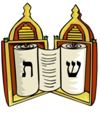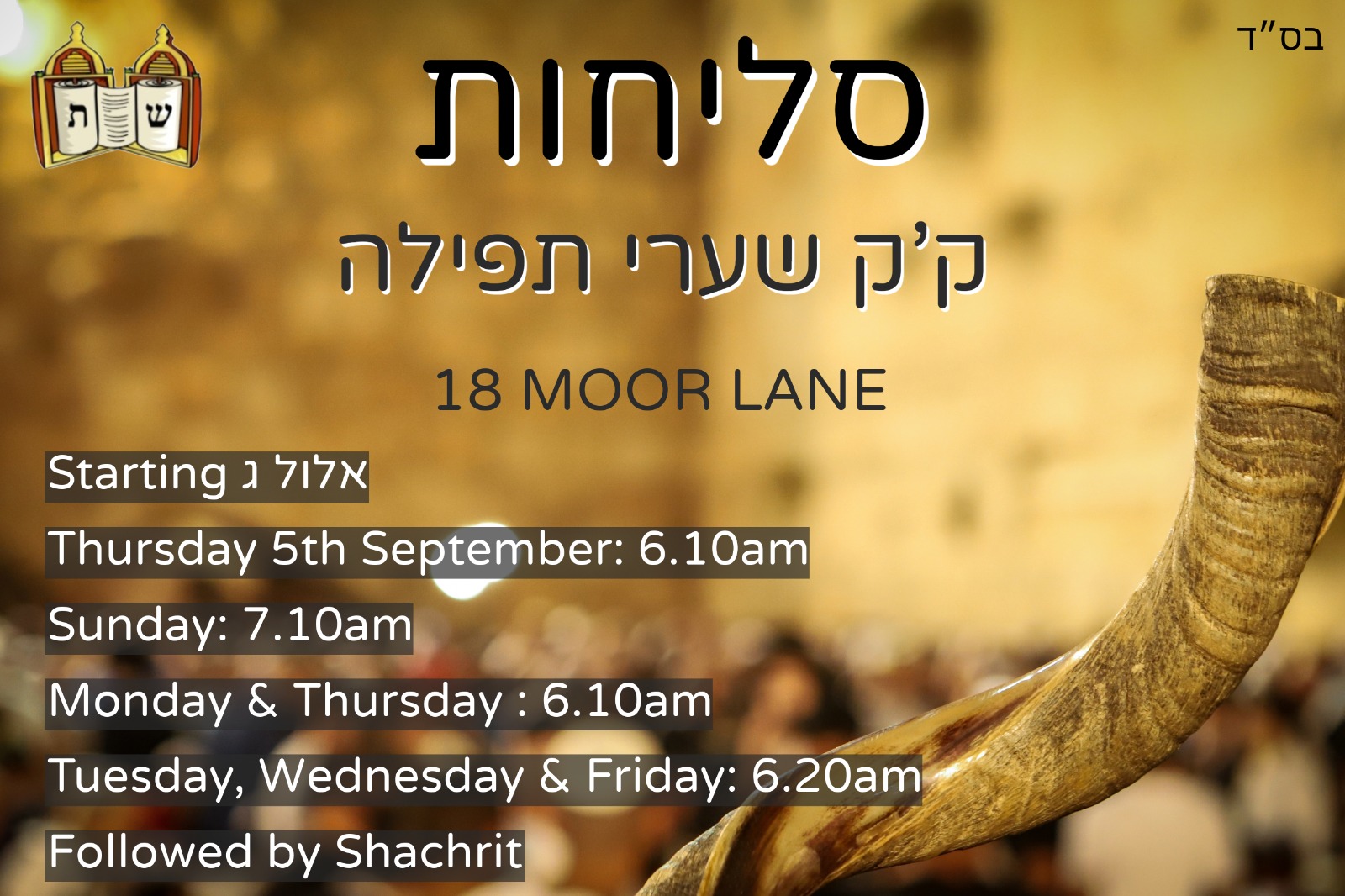
ק׳ ק׳ שׁערי תפילה

******

*****
Machazorim



Do you have any Machazorim that belong to Moor Lane?
We are missing several Machazorim
and need them returned in time for the Yamim Noraim.
if you have any Machazorim
please return them as soon as possible
Thanking you in advance
The Gabaim
****

𝐑𝐞𝐠𝐢𝐬𝐭𝐞𝐫 𝐍𝐎𝐖 (𝐥𝐢𝐧𝐤 ⬇️) & 𝐒𝐀𝐕𝐄 𝐓𝐇𝐄 𝐃𝐀𝐓𝐄 – 𝐎𝐂𝐓 𝟔 (if you have already done so pls share with family/friends)
As Hamas continues to refuse to release the hostages & Israel remains under constant attack by Hezbollah 𝐌𝐚𝐧𝐜𝐡𝐞𝐬𝐭𝐞𝐫 𝐌𝐔𝐒𝐓 𝐬𝐭𝐚𝐧𝐝 𝐭𝐨𝐠𝐞𝐭𝐡𝐞𝐫 𝐚𝐬 𝐚 𝐜𝐨𝐦𝐦𝐮𝐧𝐢𝐭𝐲 𝐩𝐮𝐛𝐥𝐢𝐜𝐥𝐲 & 𝐩𝐫𝐨𝐮𝐝𝐥𝐲!
🇮🇱 On Sunday, October 6, 2024, we are calling on the Jewish community of Manchester and the North West, together with our dear non-Jewish friends and supporters, to gather together to march through – and rally in – Manchester city centre to show our loud and proud support for the State of Israel and the IDF, to call for the release of all the hostages immediately, to remember and mourn the thousands of people brutally murdered on October 7 and to say loudly – NEVER AGAIN IS NOW.
🇮🇱 Zionists are being blamed for everything in the UK & Israel is under attack from all sides
⬇️REGISTER NOW & SHARE WITH FAMILY/FRIENDS!⬇️
Please register for more information on location, speakers and other event details here – https://www.eventbrite.co.uk/e/manchester-stands-with-israel-march-and-rally-tickets-972071611357
******
Parasha Questions attached

*****
לוח זמני תפלה לקיץ תשפ״ד
Summer Timetable 5784 – 2024
מוצאי שבת | ערבית )מוצ”ש( | שקיעה | סוף זמן קראת שמע | זמן שבת | פלג מנחה (תה״ד) | פלג מנחה (לבוש) | מנחה וקבלת שבת | תאריך | שבת פרשת |
Shabbat Ends | Arbit | Sunset | Shema to be read before | Candles to be |
| Earliest Candle lighting | Minha & Kabbalat Shabbat* | Date | Parasha |
PM | PM | PM | AM | PM | PM | PM | PM |
|
|
8:16 | 8:12 | 7:25 | 9:52 | 7:13 | 6:39 | 6:09 | 6:40 | 13/14 Sep | כי תצא |
For those not in the Bet Hakeneset, but wishing to bring in Shabbat with the Kahal, candles should be lit about 30 minutes after the time listed for Minha and Kabbalat Shabbat, unless the time listed in the ‘latest candle lighting’ column is earlier, when candles MUST be lit by that time, in all cases
שבת
קרבנות
9:00 am
הודו
9:15 am
מנחה
6:30 pm
6:40 pm

*************
The Torah describes the only permissible way a woman captured in battle may be married. If a man marries two wives, and the less-favored wife bears a firstborn son, this son's right to inherit a double portion is protected against the father's desire to favor the child of the favored wife. The penalty for a rebellious son, who will inevitably degenerate into a monstrous criminal, is stoning. A body must not be left on the gallows overnight, because it had housed a holy soul. Lost property must be returned. Men are forbidden from wearing women's clothing and vice versa. A mother bird may not be taken together with her eggs. A fence must be built around the roof of a house. It is forbidden to plant a mixture of seeds, to plow with an ox and a donkey together, or to combine wool and linen in a garment. A four-cornered garment must have twisted threads tzitzit on its corners. Laws regarding illicit relationships are detailed. When Israel goes to war, the camp must be governed by rules of spiritual purity. An escaped slave must not be returned to his master.
Taking interest for lending to a Jew is forbidden. The Jewish People are not to make vows. A worker may eat of the fruit he is harvesting. Divorce and marriage are legislated. For the first year of marriage, a husband is exempt from the army and stays home to rejoice with his wife. Tools of labor may not be impounded, as this prevents the debtor from earning a living. The penalty for kidnapping for profit is death. Removal of the signs of the disease tzara'at is forbidden. Even for an overdue loan, the creditor must return the collateral daily if the debtor needs it. Workers' pay must not be delayed. The guilty may not be subjugated by punishing an innocent relative. Because of their vulnerability, converts and orphans have special rights of protection. The poor are to have a portion of the harvest. A court may impose lashes. An ox must not be muzzled while threshing. It is a mitzvah for a man to marry his brother's widow if the deceased left no offspring. Weights and measures must be accurate and used honestly. The Torah portion concludes with the mitzvah to erase the name of Amalek, for, in spite of knowing about the Exodus, they ambushed the Jewish People.
Ohr Somayach Institutions www.ohr.edu

הלכות תשובה
חודש אלול הוא חודש הרחמים והסליחות, ועל כן חובה קדושה על כל אדם מישראל, איש ואשה, לפשפש במעשיו כפי כוחו בימים אלו, ולשוב בתשובה לפני ה'. וכאשר נבוא לדין לפני ה' יתברך ביום ראש השנה, יתמלא עלינו ברחמיו, ויחדש עלינו שנה טובה. ולא ראוי לאדם בן דעת, לאחר את התשובה ולדחותה, וכמו שכתב בספר מסילת ישרים, כי לא ימצא איחור התשובה אלא בעמי הארץ. וכתב מרן רבינו עובדיה יוסף זצ”ל בשם רבינו האר”י ז”ל, שראוי לכוין היטב בימים אלו בברכת השיבינו שבתפילת שמונה עשרה, ולהתפלל על אלה שנטו מתורת ה', וביחוד אם הם קרוביו, כי ימים אלו הם עת רצון ומסוגלים לכך, כי ימינו של ה' יתברך פשוטה לקבל שבים.
וכן היו נוהגים בזמן שבית המקדש היה קיים, והיו החוטאים מביאים קרבן חטאת או אשם לכפר על חטאתם, היו מתודין על חטאתם. שכל מי שאינו עושה תשובה, לא מתכפרין לו עוונותיו אפילו יקריב אלף קרבנות לשם ה'. והוידוי הוא מעיקרי (מתנאי) התשובה, נמצא מי שלא התודה על עוונו, לא קיים מצוות התשובה.
ובזמנינו שחרב בית המקדש, ואין לנו מזבח להקריב עליו קרבנות, אין לנו אלא תשובה בלבד, וכל מי שעשה תשובה שלימה, אין מזכירין לו (ביום שיתן דין וחשבון על מעשיו) שום דבר מעוונותיו.
נמצינו למדים שיש שלשה עיקרים במצות התשובה, שיתודה השב על חטאו בפיו. ושיקבל על עצמו שלא לחזור על חטאיו עוד. ושיתחרט על חטאו בלבו. וכל העושה כן, קיים מצות התשובה, והרי הוא אהוב לפני בוראו, ועליו אמר רבי עקיבא (ביומא פה:), אשריכם ישראל, לפני מי אתם מטהרין ומי מטהר אתכם?, אביכם שבשמים, שנאמר “מקוה ישראל ה'”, מה מקוה מטהר את הטמאים, אף הקדוש ברוך הוא מטהר את ישראל.
The Mitzvah of Teshuva (Repentance)
The Mitzvah of Confession
The Rambam writes (in the beginning of his Hilchot Teshuva) that if one transgresses any of the Torah’s commandments either knowingly or unknowingly, when one repents, one must confess one’s sin before Hashem, as the verse states, “If a man or woman shall perform any sin etc., they shall confess the sin which they have committed” which refers to actually confessing one’s sin verbally. This confession is actually a positive Torah commandment. How should one confess? One must say, “Please Hashem, I have sinned, transgressed, and have committed iniquities before you and I now regret and am ashamed of my actions and I shall never again do this (meaning that one must accept upon himself never to commit this sin again).” This is the primary aspect of the confession. The more one confesses and speaks lengthily in this manner, the more praiseworthy one is.
This was indeed the practice when the Bet Hamikdash stood when a sinner would bring a “Chatat” or “Asham” offering to atone for his sin, he would confess his sin upon the offering, for if one does not repent for one’s sin, one will not achieve atonement even if one brings one-thousand offerings to Hashem. Confession is an integral part of the Teshuva process and one who has not confessed his sin has not fulfilled the Mitzvah of Teshuva.
Nowadays when the Bet Hamikdash unfortunately lies in ruins and we have no Mizbe’ach (altar) to offer our sacrifices on, all we have left is Teshuva. Indeed, one who repents fully shall not be reminded at all of one’s sins on the Day of Reckoning.
Commitment for the Future
Another provision of the Mitzvah of Teshuva is that the repentant individual must accept upon himself never to return to his sin again, for instance, if one transgresses a negative Torah commandment, such as Shabbat desecration or if one ate foods requiring checking for worms without checking or if a woman was lax about the modesty of her clothing and the like, one must whole-heartedly accept upon one’s self never to repeat the sin. Similarly, if one has transgressed a positive Torah commandment, such as one who has not recited Kiddush on Shabbat or if one did not adequately honor one’s parents and the like, one must accept upon one’s to perform these Mitzvot properly from now on. However, if one says, “I shall sin and I shall repent, I shall sin again and repent again,” he will never be afforded the opportunity to repent.
Remorse
One must likewise feel remorse for the sins one has committed by realizing the wickedness of one’s actions and how much one has angered his Creator Who bestows so much good upon him. However, if one does not regret one’s deeds, even if one forsakes the sin completely and never performs it again and even if one has confessed one’s sin, one has not fulfilled the Mitzvah of Teshuva and one will remain unforgiven for his sin.
Based on the above, there are three primary aspects of Teshuva: Verbally confessing one’s sin, accepting upon oneself never again to commit these sins, and truly feeling remorse for the sin in one’s heart. If one does all of these things, one has fulfilled the Mitzvah of Teshuva and is beloved by his Creator. About such a person did Rabbi Akiva exclaim: “Fortunate are you, Israel! Before Whom are you becoming purified and Who is purifying you? Your Father in Heaven! As the verse states, ‘The Mikveh (hope) of Israel is Hashem’- just as a Mikveh purifies the impure, so does Hashem purify the Jewish nation.”